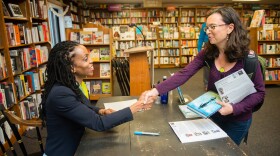“Everything begins with starlight.” So writes David Fideler in the opening of his new book, Restoring the Soul of the World: Our Living Bond with Nature’s Intelligence (Inner Traditions/Simon & Schuster, 2015). Gazing at the stars was how it began for Fideler, a native of Grand Rapids, Michigan who moved to Sarajevo in Bosnia in 2011.
“Ever since I was very young, I was interested in the stars,” Fideler says. “It was a very serious interest, and as I grew older it developed into an interest in science, and from that, philosophy.”
Fideler studied ancient philosophy and religion at the University of Pennsylvania and holds a Ph.D. in philosophy and the history of science. He also built his own telescope, traveled north with it to view the night skies, and later built his own observatory. That passion has remained with him all his life.
Fideler’s interest in astronomy, along with philosophy and the humanities, all came together in his new book that addresses the current disconnect between humanity, Nature, and the universe.
“For millennia the world was seen as a creative, interconnected web of life — a web of life in which we participated deeply,” Fideler writes. “But when the world came to be described as a lifeless, clock-like mechanism during the Scientific Revolution of the 16th and 17th centuries, life and intelligence came to be seen as existing only in human beings, and nature came to be increasingly seen as an object of exploitation that primarily exists to meet human needs. This also led to a profound sense of alienation, since human beings no longer had any real bond with the world.”

In Restoring the Soul of the World, Fideler examines how that disconnect happened, then explores how we might connect once again. He weaves science, religion, culture, and our world views to suggest solutions. If we do not, he warns, we face global destruction. Rather than seeing Nature as an enemy to be controlled or as a slave to be brought into submission and exploited, he urges us to approach the earth as gardeners: caring and nurturing the earth in a collaborative way. If we see Nature as our teacher and partner, we can bring the world to fruition.
“Everything has two sides to it,” he says. “Today life is mechanical and trivial, very utilitarian. Technology has liberated us in terms of freeing time but are we making good use of that time?”
For instance, Fideler says the World Wide Web was at first seen to be a potential shift in consciousness but instead became, in great part, commercialized or filled with cat videos.
Instead, Fideler says, “Nature is the book we should be reading. We need to hear the voice of Nature. Our intelligence is a direct outgrowth of Nature’s intelligence.”
Technology has damaged the world nearly beyond repair, he says, but has simultaneously brought us a deeper understanding of our world — like the telescope that brought the heavens closer for Fideler’s contemplation.
“We need to learn from Nature without destroying it,” cautions Fideler. “The human flourishing — that doesn’t happen in a dead world; the world must flourish, too.”
David Fideler is the editor of the Pythagorean Sourcebook and Library, the journal Alexandria: Cosmology, Philosophy, Myth, and Culture, and the Cosmopolis Project website.
Listen to WMUK's Between the Lines every Tuesday at 7:50 a.m., 11:55 a.m., and 4:20 p.m.





